|
|
|
Sort Order |
|
|
|
Items / Page
|
|
|
|
|
|
|
| Srl | Item |
| 1 |
ID:
185144
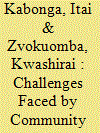

|
|
|
|
|
| Summary/Abstract |
Volunteer scholarship in Zimbabwe tends to focus on volunteer motivations, volunteers’ role in community development and, to a lesser extent, volunteers’ challenges. In this study, we captured the lived experiences of volunteers in the current milieu of socio-economic challenges. We discovered that the major challenges affecting community volunteers in the Chegutu District are poverty and vulnerability, burnout, too much work, lack of community appreciation of volunteerism and lack of adequate volunteer paraphernalia. We move beyond other studies to explore how volunteers are coping with the challenges. Volunteers are reliant on spiritual support and encouragement by some community members. The study adopts a qualitative approach with data collected using in-depth interviews and focus group discussion. The findings are presented and discussed thematically.
|
|
|
|
|
|
|
|
|
|
|
|
|
|
|
|
| 2 |
ID:
190165
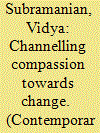

|
|
|
|
|
| Summary/Abstract |
This article explores how young elite urban professionals and fresh graduates in Mumbai and Delhi are fostering diverse aspirations of service, entrepreneurship and charting new professional mobilities through volunteering opportunities at a well-known corporate-supported non-governmental organisation (NGO), the Teach for India (TFI) programme. Mostly with commerce, engineering and management educational backgrounds, the TFI intervention operates as a nodal site for these elite youth to not just serve underprivileged children through ‘acts of compassion’ but also channel their experiences to understand the education system and reinvigorate it through corporate management values of enterprise and performance. Through examining the trajectories of these individuals, I foreground the nascent terrain of technocratic expertise being shaped through an interlinked collective of corporate NGOs that have become prominent in advising the Delhi state government, under the leadership of the Aam Aadmi Party (AAP), to improve public education through discourses of enterprise and performance.
|
|
|
|
|
|
|
|
|
|
|
|
|
|
|
|
| 3 |
ID:
128527
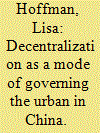

|
|
|
|
|
| Publication |
2013.
|
| Summary/Abstract |
This paper considers what a Foucauldian-informed analysis of decentralization and urban transformation offers to current debates. It analyzes decentralization as a new regime of governing, in contrast to many studies that treat it as a policy process, objective or outcome aimed at alleviating some problem of centralized authority. Rather than understanding decentralization as less state governance, this paper asks how practices such as local autonomy are in fact technologies of governing the urban. Decentralization is analyzed then not simply as an absence of some central state power, either in the political or fiscal realm, but rather, as new mechanisms of governing the urban, which are linked with the regulation and constitution of subjects. The paper focuses on an aspect of decentralization that typically is under-examined: the decentralization of welfare provisioning in urban China. Under high socialism of the Maoist era, social services for urban residents were distributed by the state, through the work unit (danwei) as part of the planned economy. In recent years, however, major reforms have been put into place to diversify the ways in which social services are delivered, under a general rubric of decentralizing the distribution away from the state. Based on anthropological research in Dalian, a major port city in northeast China, this paper examines a new social practice and subject form that has emerged with new ways of caring for those in need in the city: volunteerism. By focusing on this resulting social form, the paper argues that we may better understand how decentralization is not a singular process with multiple outcomes, but rather, a complex assemblage of elements that includes technical questions about how to govern as well as normative practices of subject formation. An analytical disaggregation of these elements also allows us to avoid the assumption that decentralization necessarily contains certain characteristics, or that it will lead to particular kinds of political and social forms.
|
|
|
|
|
|
|
|
|
|
|
|
|
|
|
|
| 4 |
ID:
168473
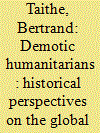

|
|
|
|
|
| Summary/Abstract |
This article focuses on over 70 years of demotic humanitarianism from a grassroots perspective. Using the archives of Hudfam and Elizabeth Wilson as well as more recent oral history of local nongovernmental organisations in the West Yorkshire region of the United Kingdom, this paper seeks to cast a new light on the complex network of humanitarianism enabled by local groups. The concept of demotic humanitarians will be used here to denote the modest scale of this work, but also the humanitarians’ self-perception as local agents of internationalism acting within localised networks. From the creation of Hudfam in 1942 (before Oxfam but in Huddersfield) to the birth of the Christian African Relief Trust or local partnerships with Ghana, this article shows how entangled in other social and political initiatives demotic humanitarians were.
|
|
|
|
|
|
|
|
|
|
|
|
|
|
|
|
| 5 |
ID:
140292
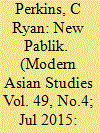

|
|
|
|
|
| Summary/Abstract |
In the second half of the nineteenth century an increasing number of Indians entered the world of volunteerism and public activism. One such individual was the prolific Urdu writer Abdul Halim Sharar (1860–1926), who served as the secretary for a short-lived voluntary association, the Anjuman-e Dar-us-Salam, during the late 1880s in Lucknow, India. Using readers’ letters as printed in Sharar's widely circulating monthly periodical, Dil Gudāz, this article seeks to understand the reasons behind the increasing role of volunteerism as part and parcel of a modern sharīf Muslim identity in the post-1857 period. Having adopted the role of a community activist, Sharar began using his periodical, soon after its inception, to mobilize and recruit his readers to participate in what he described as a passionate movement sweeping through the ‘Islami pablik’. Both rhetorical and descriptive, such an idea provided hope for a divided and struggling community to overcome the divisions that were central to their many challenges in a post-1857 world. Through the study of the vicissitudes and challenges faced by Sharar and his fellow activists, this article underscores the ways in which public activism and volunteerism simultaneously represented the possibility for Muslims to use their own resources to bring about real social and political change, and also reminded them of their shortcomings and the limits of an informal activism. This article seeks to show that ultimately, even such ‘failed’ and ephemeral attempts were foundational for more effective mass mobilization efforts in the following decades and into the twentieth century.
|
|
|
|
|
|
|
|
|
|
|
|
|
|
|
|
| 6 |
ID:
137807


|
|
|
|
|
| Summary/Abstract |
Volunteering in late life is associated with health benefits such as reduced risk of hypertension, improved self-related health and well-being, delayed physical disability, enhanced cognition, and lower mortality. Although the mechanisms of these correlations are not clear, increases in physical activity, cognitive engagement, and social interactions likely play contributing roles. Volunteers are typically thought to represent a select group, often possessing higher levels of education and income, good health, and strong social networks. However, group evidence indicates that there are many members of groups of lower socioeconomic status (SES), including elderly adults, who serve their communities on a regular basis and in high-priority programs. We propose that the impact of volunteering in an aging population be recognized and invested into, and that effective programs harness social capital of older adults to address critical societal needs and also improve the well-being of older adults. While members of low-SES groups are less likely to volunteer, they exhibit disproportionately great benefits. The Experience Corps represents a model of an effective volunteerism program, in which elders work with young schoolchildren. Existing federal initiatives, in cluding the Foster Grandparent Program and Senior Companion Program – which target low-income elders – have had low participation with long waiting lists. Given the proven benefits and relatively low proportion of older persons who volunteer, enhancement of elder volunteerism presents a significant opportunity for health promotion and deserves consideration as a national public health priority.
|
|
|
|
|
|
|
|
|
|
|
|
|
|
|
|
|
|
|
|
|